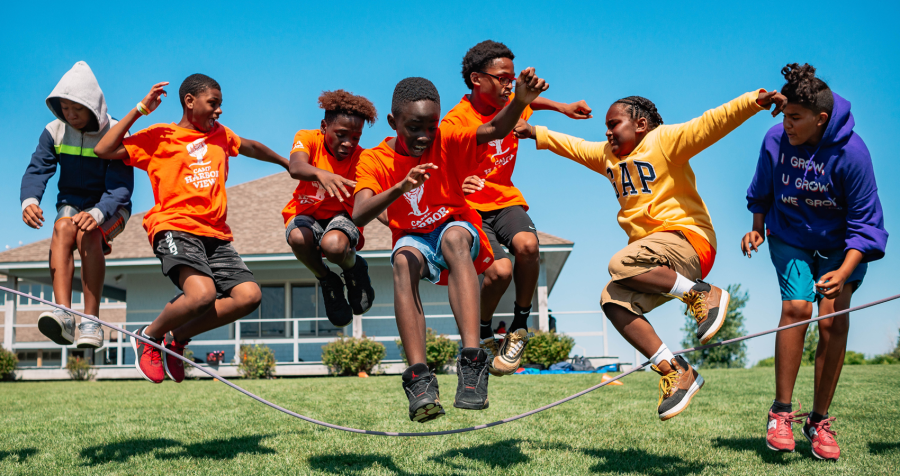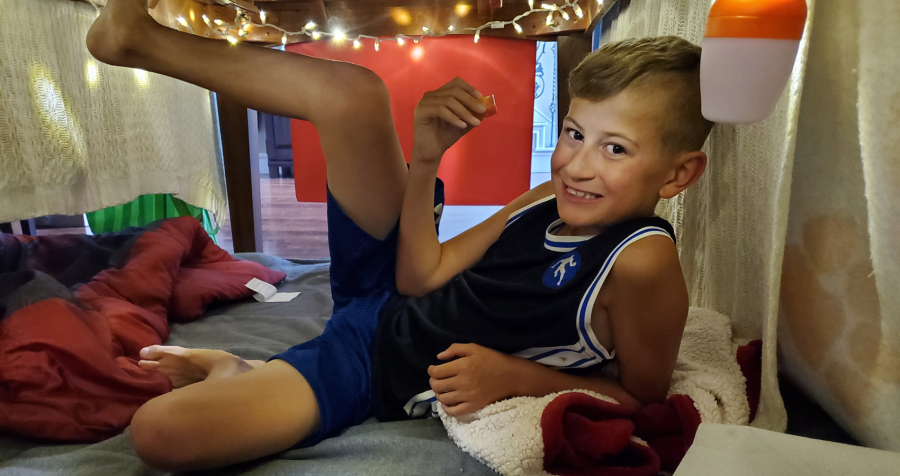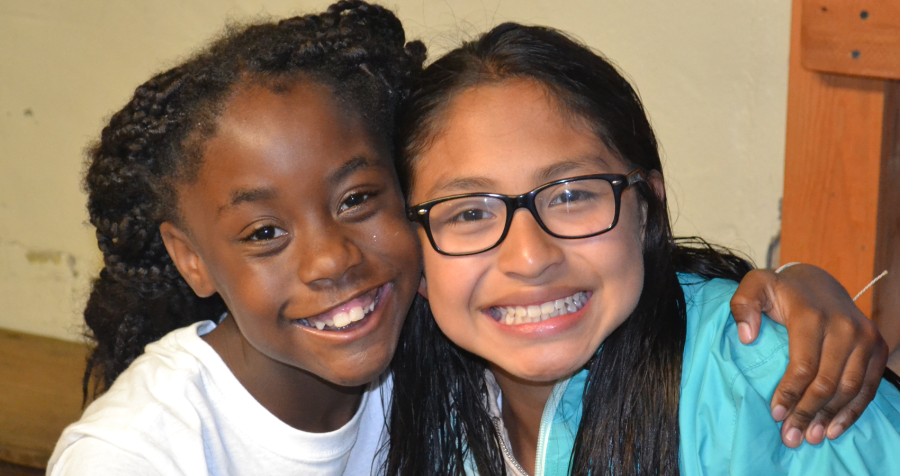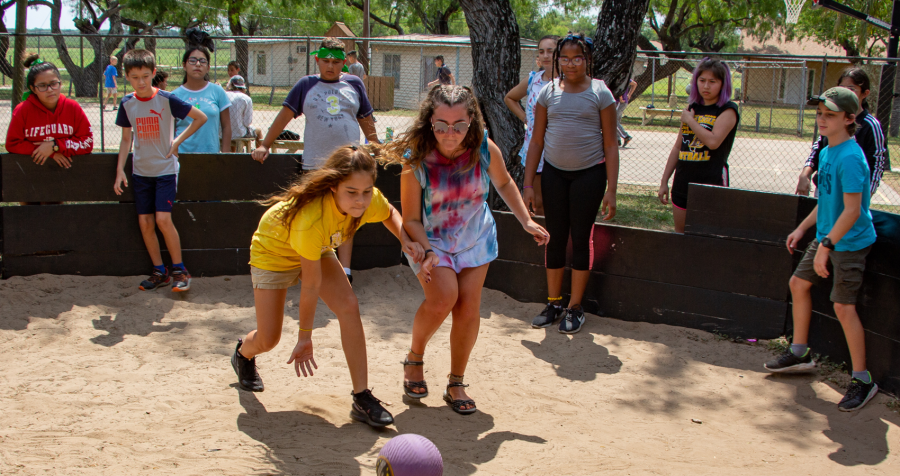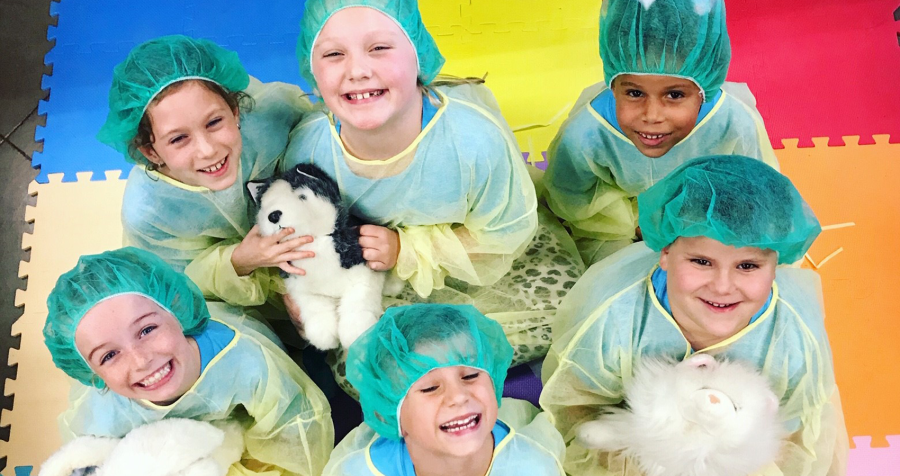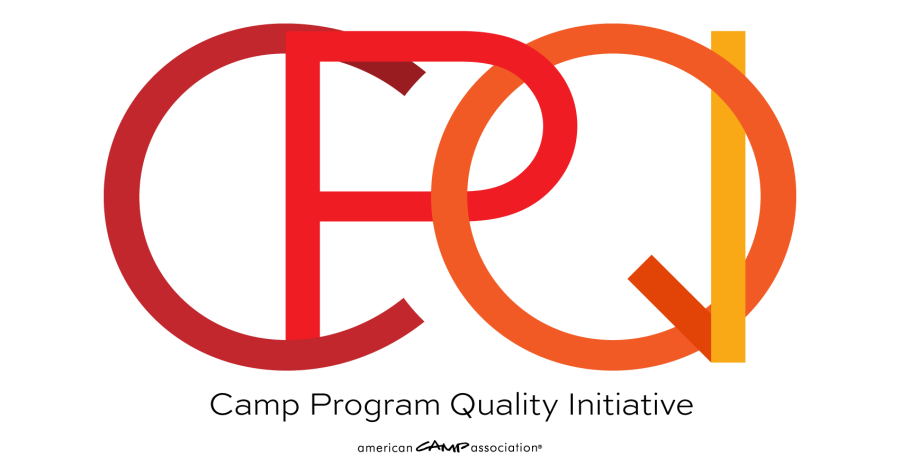Each year, ACA’s Eleanor P. Eells Award for Program Excellence honors camps that embody the spirit of the award’s namesake through their efforts to provide exceptional programming that effectively and innovatively addresses the needs of people and society through the camp experience. We celebrate the 2022 recipients. They are all prime examples of the right camp program’s capacity to equip campers of all abilities and backgrounds with the determination, desire, and belief to build brighter futures for themselves and their communities.
Camp Harbor View
When Camp Harbor View (CHV) started back in 2007, cofounders Thomas M. Menino (then-Mayor of Boston) and local businessman Jack Connors, Jr., wanted to create a safe space where middle schoolers could have fun, make friends, and grow as leaders.
In the last 15 years, CHV has grown exponentially. Now CHV serves more than 1,000 young Bostonians and their families each summer, offering a one-of-a-kind summer camp experience for campers grades 6–9, leadership experiences for kids in grades 10–12, and family services that include college and career planning, scholarships, and clinical support — all at no cost to families.
“The CHV community is about much more than summer fun in the Boston Harbor Islands. We build relationships that transcend summer and camp, investing in the well-being of young people and families over the long term,” says CHV Camp Administrator Jillian Martin, LCSW. “In offering programs that emphasize community and promote social and economic mobility, participants take away both the skills and confidence to be leaders in their neighborhoods and changemakers moving the city of Boston toward a more equitable future.”
The CHV team — a full-time team of program staff, clinicians, and social workers — continues to innovate and build targeted pilot programs that aim to address acute needs of families across the city of Boston. One such program is their Guaranteed Income pilot, which launched in 2021 with 50 CHV families. Martin says CHV is proud to be part of a national movement that gives families agency and autonomy.
“Our team is nimble — we’re constantly listening and learning from our community, and, in all of our programs, we seek to center the voices and experiences of young people,” Martin says.
CHV may be young, but the team has big hopes for the future.
“Our goal is to build a sustainable CHV for generations to come,” Martin says. “We hope to continue to be a champion of young leaders, a trusted resource for families, and a change agent in Boston.”
Camp John Marc
For more than 30 years, Camp John Marc has served children, teens, and families living with chronic illnesses and physical challenges, inspiring confidence for life through year-round programming at their specialized camp facilities that are uniquely designed in partnership with local pediatric hospitals, community volunteers, and health organizations.
“From the layout of the campground to the heart of the program, our goal is to provide a high-quality and unique outdoor experience,” says Operations Manager Bre Loveless. “Campers with chronic illnesses are often told what they can’t do — attend in-person school or play contact sports. But at Camp John Marc we focus on all that they can do — like make new friends, try new foods, and all kinds of adventures.”
In May 2020, in response to the COVID-19 pandemic, Camp John Marc created an online program called Camp Is More Than a Place to keep campers connected to camp even when they were unable to gather in person. The program came to life through the hard work of Camp John Marc, Dallas-Fort Worth pediatric hospital systems, partner camps, alumni staff, volunteer counselors, and former campers. Campers were able to experience camp through recorded and live activities via computer, tablet, phone, and hospital television networks.
Through these efforts, Camp John Marc found new ways to keep the magic of camp alive with behind-the-scenes tours, a teddy bear zip line, underwater footage of the catfish swimming in the lake, horses’ vet visits, and more. Campers were able to write letters to their favorite horses, tell stories, and sing along to campfire songs.
When it could be done safely, the program offered socially distant events that included carloads of families playing bingo in the parking lot of a drive-in theater, playing car archery, and pool noodle high-fives.
While the Camp Is More Than a Place program was born from needs that arose during the height of the pandemic, Camp John Marc plans to utilize the program for years to come.
“While much of the heaviness of the COVID-19 pandemic has been lifted, we understand that children with chronic illnesses and physical challenges will always be the most vulnerable in our society,” Loveless says. “The Camp Is More Than a Place program will connect campers unable to join us for in-person camping to the magic of camp — adventure, friendship, joy, nature, and more! Computers, tablets, phones, and hospital television networks will continue to provide access to the camp experience alongside their family members and medical staff.”
Camp for All Kids
Camp for All Kids is a program that provides annual four-week camperships that enable Black and brown children from historically underresourced communities to experience overnight summer camp experiences.
By bridging the opportunity gap, the Camp for All Kids program facilitates a racially diverse camp community, which benefits all campers, staff, and the community at large.
One unique aspect to the Camp for All Kids program is that the camp scholarship is renewable.
“Once a camper gets a scholarship, they are able to go back to the same camp until they age out — so it’s not just one time,” says Rikki Ray, director of development. “They are able to form lifelong friendships and relationships and become integrated into the whole camp community.”
In addition to the four-week campership program, Camp for All Kids also runs a weeklong fellowship program that seeks to empower Chicago teens to realize their full potential by taking them out of the city of Chicago for a week of self-discovery and camaraderie.
Camp for All Kids hopes to create lifelong programs, finding ways to engage alumni and keeping in touch with campers for the full year rather than just during the time of the program.
They are also hoping to expand the programs, which are serving 200 campers this year. According to Ray, they hope to serve 300 campers next year between the two programs.
Mo-Ranch Camp in the Valley
In 2017, Mo-Ranch Camp launched their Camp in the Valley program, which takes camp to kids in the Rio Grande Valley. The program started out of Mo-Ranch’s desire to make camp a reality for kids everywhere. Taking camp to them allows kids to experience all the things that make camp great — worshipping, playing games, swimming, eating meals together, etc. — in a location that is familiar to them and where they feel comfortable.
“We take our residential camp to the valley, and when we do that, we take the same counselors,” says Julie Chapa, vice president of sales, programs, camps, and operations. “Counselors come in two to three weeks before camp starts and become certified in CPR, trained as lifeguards . . . we also have a nurse that goes into the valley as well. With any camp parents, [safety] is a big piece. They don’t just get the camp experience — they get the same quality of camp that we offer here [at Mo-Ranch Camp].”
Mo-Ranch makes camp accessible to the whole community through having the innovative mindset of how can we make camp happen for everyone?
By reaching out to their community, Mo-Ranch found out that many people were willing to help and donate their resources, whether that was financially or by offering their skills, talents, and time. Throughout the year, Blanca Barrera, sales manager, spends time in the valley cultivating relationships with churches and parents, spreading the word about the program. Many churches help year round to raise the funds that make this program possible.
Right now, Camp in the Valley is a one-week program that serves approximately 60 to 80 campers, and they hope to extend their program to include a second one-week session when the time is right. But the impact on the community is already obvious.
“Kids who we had at camp have now come to Mo-Ranch to be camp counselors,” Chapa says. “They’re part of the family that keeps the bond strong during the year.”
The benefits of the Camp in the Valley program aren’t limited to the campers — they are felt by everyone involved.
As a team, Mo-Ranch staff learns so much from the kids and the experience that they say it feels like they get so much more out of it than the kids. At Mo-Ranch, they feel all kids deserve summer camp, and if they can do something to make that happen, they will.
The Arizona Humane Society
The Arizona Humane Society (AHS) recognizes that teaching children about compassion toward animals, responsible pet ownership, and STEM careers in animal welfare is a major factor in combatting pet overpopulation and animal abuse — so they created educational summer youth programs to help kids engage and grow.
“AHS Education and Outreach’s small but mighty team not only runs these camps, but also is responsible for putting together creative, engaging curriculum that keeps children coming back each year to learn even more about our animal friends,” says Kelsey Dickerson, AHS spokesperson. “These summer animal camps teach kids how to train and care for animals, be responsible pet guardians, align their choices with their values, and make our community a safer place for all animals.”
In only six years, AHS youth summer camp programs have positively impacted the lives of thousands of kids ages 5 to 17 through dozens of weeklong youth camp sessions that provide hands-on learning opportunities taught by professional informal educators, AHS veterinarians, veterinarian technicians, Emergency Animal Medical Technicians (EAMTs), and more.
AHS also has “animal teachers” — small mammals, reptiles, invertebrates, and amphibians who assume the role of ambassadors and help young children develop an appreciation and compassion for living things through up-close observation and interaction. The animal teachers come to AHS from a variety of circumstances — some were surrendered or transferred from another rescue organization, and some were rescued after being abused, abandoned, or injured. They then become ambassadors for the education programs because their stories inspire caring, empathy, and hope.
AHS hopes that the addition of new space enables them to continue to serve more local youth.
“The upcoming addition of a new campus will allow AHS to expand into different areas of our community — and eventually offer programs at additional locations — in order to be more accessible for youth looking to connect with animals,” Dickerson says. “In an effort to ensure our programs are inclusive for everyone, no matter their differences, AHS’s Education and Outreach team works incredibly hard to ensure each student is able to participate through inclusivity and the offering of financial aid where possible. Through this expansion and the growth of different educational offerings, AHS hopes the program will continue to grow and reach even more children year over year to positively impact our community in this unique and engaging way.”
Eleanor P. Eells Award for Excellence in Research in Practice
Also given each year since 2015, The Eleanor P. Eells Award for Excellence in Research in Practice honors camp programs that:
- Develop and implement or apply an exemplary research or evaluation project.
- Use research or evaluation findings to improve program practice.
- Develop model research or an evaluation project that can be adapted or replicated.
- Share research or evaluation findings with others.
We salute this year’s winner.
Camp Program Quality Initiative
Camp practitioners from across the United States representing day and overnight camps, nonprofit camps, for-profit camps, agency organizations (e.g., JCC, YMCA, Fresh Air Fund, Girl Scouts, Tim Hortons Foundation Camps), camps serving youth with diverse abilities, needs, and backgrounds (e.g., medically focused, low-income) came together to adapt and pilot a sustainable continuous quality improvement system within the summer camp context.
Over the past two years, these community members joined together to:
- Network
- Share experiences and ideas related to program quality
- Adapt existing validated program quality tools to fit the summer camp context
- Implement program improvement strategies based on a quality coaching process
- Contribute to the development of new tools (e.g., a program quality assessment tool, program quality workbooks, and an inclusive camps tool)
- Ensure that each facet of the overall project elevated equity
These camps have since remained committed to improving their programs’ quality by continuing to engage in the accessible and sustainable system they helped adapt for camps. One participant, Katie Wheatley from Tim Hortons Foundation Camps, said the value of belonging to this group is that it’s “incredible to have a network of like-minded professionals doing meaningful work to prioritize program quality. The peers in the network provided different ways of viewing this work, so learning from each other has been helpful in providing tangible and usable tools.”
Kaley Amonett is the American Camp Association’s editorial communications manager.

